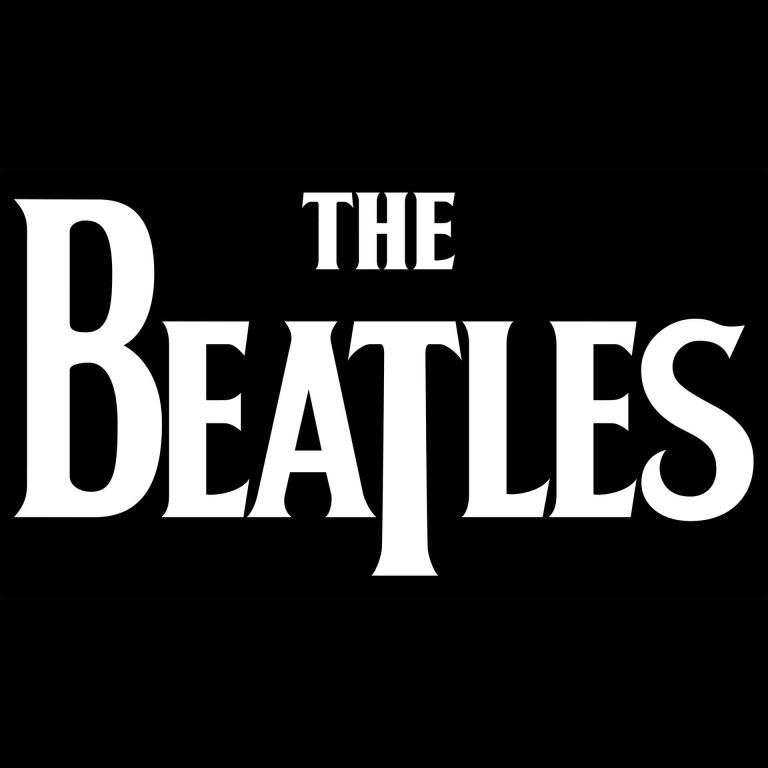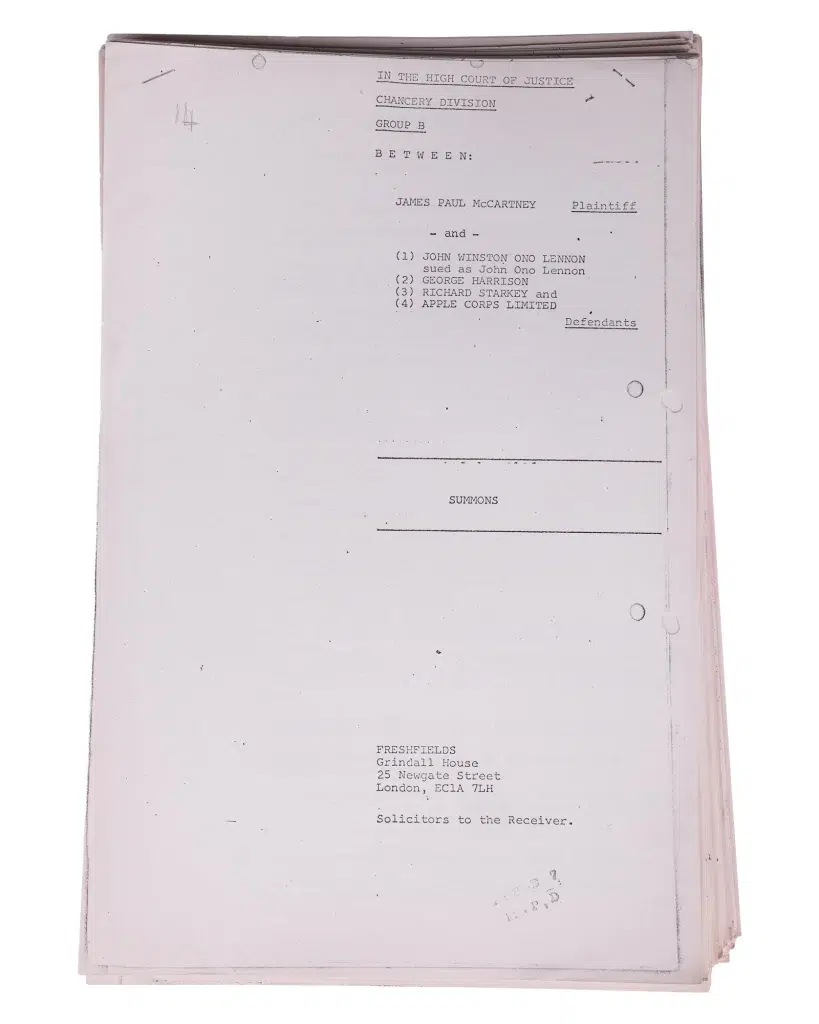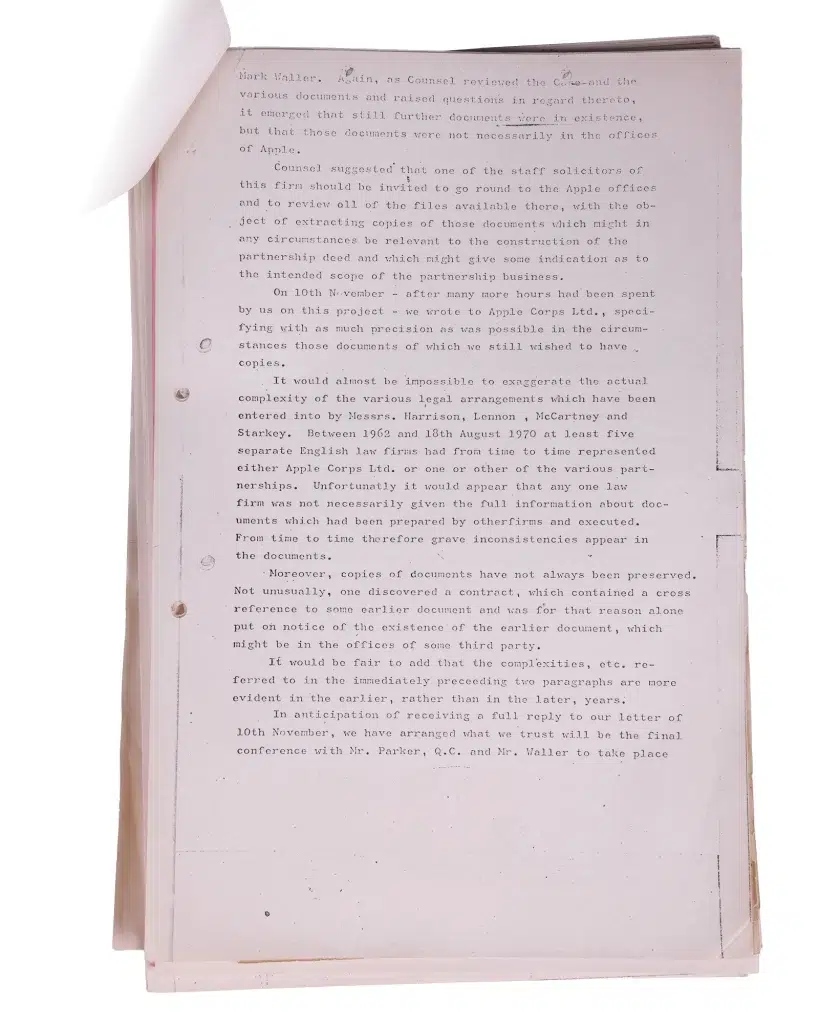
Tuesday, January 19, 1971
The case for the dissolution of the Beatles & Co opens in London High Court
Last updated on December 14, 2024

Tuesday, January 19, 1971
Last updated on December 14, 2024
Previous article Jan 09, 1971 • Paul McCartney purchases more land in Scotland
Session Jan 11, 1971 • Overdubs for "Uncle Albert/Admiral Halsey"
Session January-February, 1971 • "Ram" sessions (A&R Studios, New York City)
Article Jan 19, 1971 • The case for the dissolution of the Beatles & Co opens in London High Court
Session Jan 21, 1971 • Recording "Little Woman Love"
Session Jan 29, 1971 • Overdubs for "Smile Away"
Next article February 1971 • McCartney Productions Ltd. open New York office
On December 31, 1970, Paul McCartney filed a lawsuit against the other three Beatles – John Lennon, George Harrison, Ringo Starr – and Apple Corps, in London’s High Court, seeking an end to The Beatles’ contractual partnership, and requesting that a receiver should be appointed to manage Apple till the case is settled.
On this day, the case opened in the Chancery Division of the High Court but was adjourned. It would reopen on February 19, 1971.
None of The Beatles attended this hearing. Paul McCartney was in New York recording his “RAM” album.
From Wikipedia:
[…] The case opened in the Chancery Division of the High Court on 19 January 1971. McCartney’s counsel, David Hirst, told the court that the Beatles’ finances were in a “grave state” and outlined the three reasons behind McCartney’s claim for dissolution: the group had long ceased working together; in appointing Klein as the band’s exclusive business manager, the other Beatles had acted in breach of the partnership deed; and throughout the four years of its existence, McCartney had yet to receive audited accounts of the partnership. […]
BEATLES CASH IS SAFE – says the manager Paul ‘did not trust’
THE finances of the Beatles partnership are safe, the group’s business manager, American Allen Klein, said last night. Mr. Klein was speaking after a High Court hearing in which Beatle Paul McCartney asked for a receiver to be appointed as caretaker of assets of the partnership firm, the Beatles and Co.
During the hearing which was adjourned – McCartney’s counsel, Mr. David Hirst, Q.C., said that McCartney had never trusted Mr. Klein. Mr. Hirst also said: “Latest accounts suggest that there is not enough in the kitty to meet the individual Beatles’ income tax and surtax liabilities, let alone the corporation tax.“
Apple Corps, as well as the Beatles – McCartney, John Lennon, George Harrison and Ringo Starr – has an interest in the partnership firm. Mr. Klein said last night: “I wish to make it clear that the partnership is solvent and has more than sufficient assets to meet all income and surtax liabilities on the income of the four individual partners. Apple Corps is solvent and has more than enough cash to meet all its tax and other liabilities. At the hearing a true state of the affairs, both financial and otherwise, will be made abundantly clear.“
The court was told that there had been disagreements in the group – including “artistic differences” between Lennon and McCartney. From New York last night it was reported that Lennon and McCartney argued about who should manage the group. It ended with Paul only speaking to John through his lawyer, Lennon claims in an interview in the American paper “Rolling Stone.”
Lennon says that the Beatles almost went broke after the launching of their Apple company. “People were robbing us and living on us to the tune of eighteen or twenty thousand pounds a week.“
And he says Mr. Klein went to Britain to solve the group’s financial problems. Court Story—Page 3
From Daily Mirror – January 20, 1971

BEATLES COMPANY NEARLY BROKE, CLAIMS PAUL’S QC
THE Beatles’ partnership may not have enough money to pay tax bills, it was claimed yesterday.
Mr. David Hirst, QC, said in the High Court that the partnership’s financial position was “very, very serious.” He was representing Beatle Paul McCartney, who asked that a Receiver should be appointed as “caretaker” of the assets of the partnership the Beatles and Co. McCartney also asked for information about accounts which Mr. Hirst said had been refused by the group’s business manager, American Allan Klein. Mr. Hirst said of Mr. Klein: “He is a man of bad commercial reputation. Mr. McCartney has never accepted him as manager or trusted him. and his attitude has been fully justified.“
Yesterday’s application arose from a writ issued by McCartney last month in which he urged that the Beatles and Co. should be dissolved. McCartney, the three other Beatles – John Lennon, George Harrison and Ringo Starr – and Apple Corps all have interests in the partnership.
Millions
Mr. Hirst said that the partnership’s annual income had to be measured in millions of pounds, and there was a huge potential tax liability. He went on: “Latest accounts suggest that there is not enough in the kitty to meet the individual Beatles’ income tax and surtax liabilities, let alone the corporation tax. So grave are the accounting deficiencies and so substantial is the potential tax liability that a Receiver must be appointed.” The Beatles and Co. partnership was formed in April, 1967.
Mr. Hirst said: “The following year, and early in 1969, disagreements began to occur which eventually led to the present rift.” In January, 1969, Mr. Klein appeared on the scene for the first time. Mr. Hirst said: “Lennon proposed that Mr. Klein be appointed manager of the group, and George Harrison and Ringo Starr also became keen. But McCartney did not want Mr. Klein because he did not trust him, and wanted to be represented by a New York law firm. Eventually, matters came to a head in May, 1969, when the other three insisted on appointing Mr. Klein, or rather Abkco Industries Inc., as exclusive director. Abkco were appointed managers ‘at a fee of no less than twenty per cent. of the gross income.'”
Eventually Lennon and McCartney decided to leave the group. Mr. Hirst said that partnership accounts received by McCartney’s solicitor on Monday showed that the total amount credited to the four Beatles was £738,000. Of this £678,000 was owing in income tax. On top of that the Beatles were liable to pay surtax of £500,000.
The hearing was adjourned for a month after the other Beatles and Apple Corps promised that all money would be held jointly by their solicitors with McCartney’s solicitors.
From Daily Mirror – January 20, 1971

McCartney Suit Hearing Questions Beatles’ Finances
LONDON – Are the Beatles rich enough to meet their tax liabilities? This is the question posed as a result of a hearing here last week to determine whether the High Court will grant permission to dissolve Paul McCartney’s partnership with John Lennon, George Harrison and Ringo Starr, and appoint a temporary receiver of the partnership business. McCartney also wants information about the finances of the team.
McCartney’s lawyer, David Hirst, claimed that the financial affairs of the group are in “an appalling state” and “there probably is not enough in the kitty to meet” tax liabilities.
The hearing was adjourned after counsel for the other three Beatles, named as defendants in McCartney’s action, agreed to deposit money due to the partnership into an account jointly held by lawyers for the two sides pending a full hearing in about a month.
McCartney’s reasons for ending the partnership, Hirst said, were that the Beatles do not perform together, that he had never been given audited accounts in the four years since their partnership was formed and that he objected to Allen Klein, president of ABKCO Industries, as exclusive business manager.
Klein Answers
Klein made the following statement in London last week in reply to McCartney’s counsel’s charges: “Paul McCartney’s Application in the Chancery Court today before Mr. Justice Stamp was ex-parte (without hearing the other side) and therefore without any opportunity of reply by any of the people named in the allegations. It should be pointed out that neither ABKCO Industries, Inc., nor myself are parties to the action. While it would be inappropriate to comment, item by item on the statements made in court, I wish to categorically deny that the Beatles’ finances are in an appalling state, and I wish to make it clear that the partnership is solvent and has more than sufficient net current assets to meet all income tax and surtax liabilities on this income to the four individual partners; Apple Corps, Ltd. is solvent and has more than enough cash to meet all its tax and other liabilities and Messrs. Lennon, Harrison and Starkey have more than sufficient personal assets to meet their own personal tax liabilities. At the hearing, the true state of their affairs – financial and otherwise – will be made abundantly clear.“
From CashBox Magazine, January 30, 1971

The Beatle hassle and tribulations continue as the High Court case initiated by Paul McCartney to dissolve the alliance proceeds. The financial affairs of the partnership are in a “grave state” according to David Hirst QC, who was making a plea in behalf of McCartney for the temporary appointment of a receiver as caretaker of the partnership business and for an order that McCartney be supplied with information about the partnership finances. Mr. Hirst declared in court that “the latest accounts suggest there probably is not enough in the kitty to meet even the individual Beatles’ income tax and surtax liabilities.” He said that on a conservative estimate the foursome’s surtax liability must be £500,000. The action by McCartney seeking dissolution of “The Beatles and Co.” was adjourned on undertakings by Apple Corps to procure payment of money due to the Beatles into a solicitors’ joint account pending a full hearing in about two weeks’ time when the evidence has been completed. Mr. Hirst told Justice Stamp that McCartney had never trusted the group’s manager Allen Klein, or accepted him as manager. Klein’s counsel, Mr. A. J. Balcombe QC said a bank letter revealed that on January 15th 1971 Apple Corps had something over $2 million on deposit account.
From Cashbox Magazine, February 13, 1971




The Beatles Diary Volume 2: After The Break-Up 1970-2001
"An updated edition of the best-seller. The story of what happened to the band members, their families and friends after the 1970 break-up is brought right up to date. A fascinating and meticulous piece of Beatles scholarship."
We owe a lot to Keith Badman for the creation of those pages, but you really have to buy this book to get all the details - a day to day chronology of what happened to the four Beatles after the break-up and how their stories intertwined together!
The Beatles - The Dream is Over: Off The Record 2
This edition of the book compiles more outrageous opinions and unrehearsed interviews from the former Beatles and the people who surrounded them. Keith Badman unearths a treasury of Beatles sound bites and points-of-view, taken from the post break up years. Includes insights from Yoko Ono, Linda McCartney, Barbara Bach and many more.
Maccazine - Volume 40, Issue 3 - RAM Part 1 - Timeline
This very special RAM special is the first in a series. This is a Timeline for 1970 – 1971 when McCartney started writing and planning RAM in the summer of 1970 and ending with the release of the first Wings album WILD LIFE in December 1971. [...] One thing I noted when exploring the material inside the deluxe RAM remaster is that the book contains many mistakes. A couple of dates are completely inaccurate and the story is far from complete. For this reason, I started to compile a Timeline for the 1970/1971 period filling the gaps and correcting the mistakes. The result is this Maccazine special. As the Timeline was way too long for one special, we decided to do a double issue (issue 3, 2012 and issue 1, 2013).

Notice any inaccuracies on this page? Have additional insights or ideas for new content? Or just want to share your thoughts? We value your feedback! Please use the form below to get in touch with us.